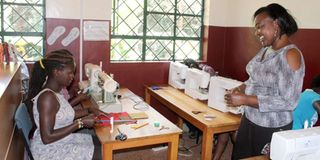Children with mothers in jail find refuge at charity

What you need to know:
- Josephine is one of hundreds of beneficiaries of the Nest rescue mission for children while their mothers serve prison terms in various correctional places in the country, including Thika, Murang’a, Nyahururu and recently Eldoret.
- In running the programme, Nest Baby Village works very closely with the prisons department and the police and has to juggle between the Ministry of Labour and Social Services, where the Children’s Department falls, and the Interior ministry, where prisons are domiciled.
The weekend she landed at Lang’ata Women’s Prison to start her three-year jail term, she went on a hunger strike and wouldn’t say a word to fellow inmates.
The administration immediately identified her as one of those needing the help of a social worker, who visits the prison weekly; not for her sulking, but the underlying reason.
The single mother of four, let’s call her Josephine, seeking to protect her children from stigma, had been accused of assaulting her landlady’s daughter in Kikuyu in May, 2018.
She insists she did not do it.
Illiterate and without a lawyer, her accuser advised her to plead guilty to “end things quickly”. She accepted. Then the wheels of justice turned unusually quickly, such that she was arrested on a Wednesday, produced in court and took plea on Friday. On Saturday, she was in Lang’ata.
“I couldn’t believe my eyes. Things were quickly falling apart. Aside from the sudden shock of having to be in prison, I was troubled by the thought of who would take care of my young ones since I am the only bread winner,” she narrated to the Saturday Nation.
Then lady-luck came calling, literally, in the name of Lucy Nduta, an officer at Nest Children’s home that offers custody to “children in conflict with the law”.
Counselling
Josephine queued outside a counselling room where Ms Nduta, one by one, engaged several distraught women – either hawkers, bartenders or prostitutes arrested in swoops by council askaris or police on night patrol – who had left their children home alone.
She also briefs inmates on how their children are doing at the home or with relatives, complete with photographs or videos. The visits were, however, cut short by Covid-19. By the time Josephine was done with the brief session, she could allow herself her first prison meal, for she was assured her children would be well-cared for at the Nest in Limuru, which is home to about 90 children aged between 3 and 18. “I am forever indebted to the home for the big favour of tending to my children,” said the middle-aged woman.
“They gave me a weekly update on how they were doing and when I left prison towards the end of 2019, I found them looking better than when I was with them,” she noted, adding that the home has not stopped checking on them.
Josephine is one of hundreds of beneficiaries of the Nest rescue mission for children while their mothers serve prison terms in various correctional places in the country, including Thika, Murang’a, Nyahururu and recently Eldoret.
The home, started by German expatriate Irene Baumgartner in 1994, was initially aimed at rehabilitating street families, but upon interrogating the children, she discovered that most ended up homeless after their mothers fell afoul of the law.
The Saturday Nation caught up with Ms Nduta at the Nest in Runda, the second of the three homes that are run by the charitable trust dependent entirely on private donations from Kenya and abroad.
The Runda home provides emergency accommodation for up to 10 teenage mothers with ongoing court cases, mostly to do with rape and incest.
Nest Baby Village
The third home, not far from the Runda one, is the Nest Baby Village, where abandoned babies are nurtured until they are adopted by a family or until they are old enough to join the children’s home in Limuru. “Women thrown into conflict with the law often abandon their children in the middle of nowhere and they end up being street urchins due to lack of care. My role as a social worker is to visit the prisons and interview newly arrested mothers who left their children unattended. I get briefings from the wardens,” said Ms Nduta.
In running the programme, the home works very closely with the prisons department and the police and has to juggle between the Ministry of Labour and Social Services, where the Children’s Department falls, and the Interior ministry, where prisons are domiciled.
“I interact with 20 to 30 such women per visit to the prison. In Lang’ata for instance, the mothers used to look forward to my arrival every Thursday, although we stopped physical visits due to Covid-19,” said the social worker.
She would take the details of their arrest and where the children were abandoned.
“Once I get those details, I work with the children's office nearest to the place of arrest and begin the process of finding them custody,” she explained.
She called on the government to consider providing lawyers for needy families faced with such circumstances.




